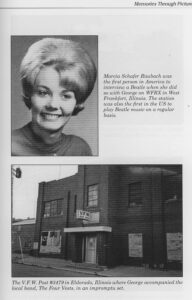 June 22, 2016–In 1963 a young gal went round to tiny Midwest radio stations trying to get them to play a record made by her little brother’s band.
June 22, 2016–In 1963 a young gal went round to tiny Midwest radio stations trying to get them to play a record made by her little brother’s band.
That girl happened to be Louise Harrison, and her brother George’s band was called The Beatles.
“Oh yes,” she said in a phone interview. “I was trying to get radio stations to play Beatles music. I was writing to Brian Epstein and George Martin and explaining how different the music business was in this country.”
She ticked off some of the ways.
“In Britain you only have the BBC,” she explained. “If you get recognized by the BBC, that’s all you need for total national coverage. In this country there were thousands of independent radio stations. I wrote and told them they needed to be with a better record label. They were with VeeJay Records. Here the big three were Capitol, Columbia, and RCA. They needed to be with a record company with a lot of clout, otherwise it doesn’t mean a thing.”
Louise found out that Capitol Records was a subsidiary of EMI, and EMI was the company George Martin worked with. Louise urged Brian to get with Capitol Records, which the Beatles eventually did. (Note: all these names mean something to Beatles fans.)
“I told them all these things, and yet no one really knows what I did to get the Beatles going,” she said. “I have letters from Brian saying they were studying carefully what I was saying.”
 We all know The Beatles did conquer the states. Was it because they took her advice?
We all know The Beatles did conquer the states. Was it because they took her advice?
“I don’t like to blow my trumpet,” Louise said with a chuckle, “But I think I did have something to do with it.”
Louise Harrison is still doing it, but now the band is Liverpool Legends, her hand-picked Beatles tribute band that plays regularly at Fredericksburg’s Rockbox Theater.
The genesis of that band happened during a Beatles weekend in Chicago just a few weeks after George Harrison died in 2001. Filling the role of George in one of the bands was a young man named Marty Scott. Louise met him after the show and they immediately hit it off.
“Wherever George went to after he went off this planet, he must have found this guy,” Louise said of Scott. “I immediately adopted him and he’s been my ‘brother’ ever since.”
Louise, who freely states she did not enjoy a financial windfall from her brother being part of history’s most successful band, thought it might be a good idea to form her own band so she’d have something to live on, and to have something to do. The Liverpool Legends have done both for her.
“We have been very, very fortunate that wherever we go, people really rave about the excellence of the band,” she said, citing that they have performed at Carnegie Hall, the Rose Bowl, and Mexico City. “We made sure we found the best performers.”
Of course there are many tribute bands, but she is passionate about how the Liverpool Legends are different.
 “The other priority was to find the guys that if George was still here, would be the kind of guys he would like to jam with,” she said. “We want to be proud of them and not besmear the legacy of my family. The Harrison name has a high degree of respect that we didn’t want to damage.
“The other priority was to find the guys that if George was still here, would be the kind of guys he would like to jam with,” she said. “We want to be proud of them and not besmear the legacy of my family. The Harrison name has a high degree of respect that we didn’t want to damage.
Most of all, she wants the music to be fun.
“Over the years we’ve talked about how the Beatles performed,” she said. “I told the guys it is very important that they are enjoying the music, and they are inviting the audience to enjoy it with them. So we have lots of audience participation, with them singing along, dancing, and waving their arms around. We want to make sure that with the way the world is today, they can come to a show and just have a jolly good time for a couple of hours.”
===
Louise narrates personal stories about her brother that are shown on video between songs at the shows. Many are well known to true Beatles fans, but it’s fun hearing them from George Harrison’s sister.
On George being called “the quiet” Beatle:
“He had strep throat when they came to the Sullivan show, and he couldn’t talk. He really was a very vigorous and lively person.”
On the famous Shea Stadium concert:
“The screaming was so loud, the audience couldn’t hear the music. At one point George explained to me that two of the band members were singing one song at the same time two were singing another.”
She shares these and other personal stories in her book My Kid Brother’s Band.